COVID-19 has certainly made an impact on ecommerce over the past couple of weeks now that isolation and social distancing measures have been put in place.
Workers in many infected countries have been asked to work from home, countries including the UK, Italy, and France have been placed under lockdown and schools have been shut down.
Unsurprisingly, many stores have since taken the decision out of consumers’ hands by shutting up shop, forcing traditional consumers to adopt ecommerce as an alternative.
Which Products Are Seeing a Rise in Demand?
Due to the closure of many schools across the globe, homeschooling and school equipment queries are seeing huge spikes in demand, good news for any retailers supplying B2C education equipment:
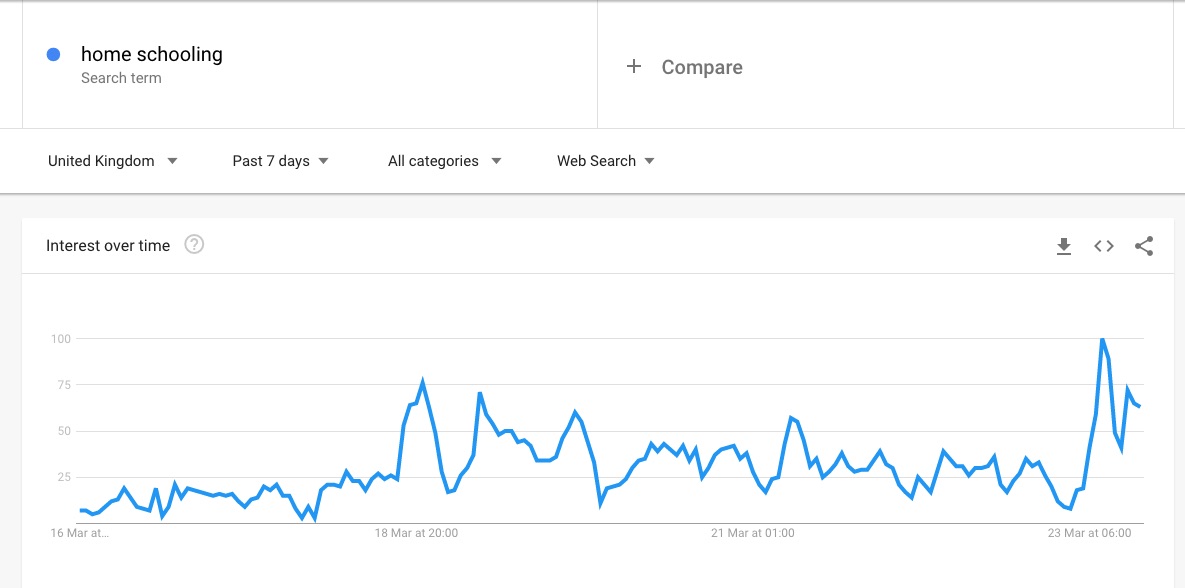 Garden furniture tends to get a lot of searches on the weekends but has demand has been rapidly growing since more severe social distancing measures were put in place across the UK and U.S. last week.
Garden furniture tends to get a lot of searches on the weekends but has demand has been rapidly growing since more severe social distancing measures were put in place across the UK and U.S. last week.
In the UK market, this kind of jump wouldn’t usually take place until April:
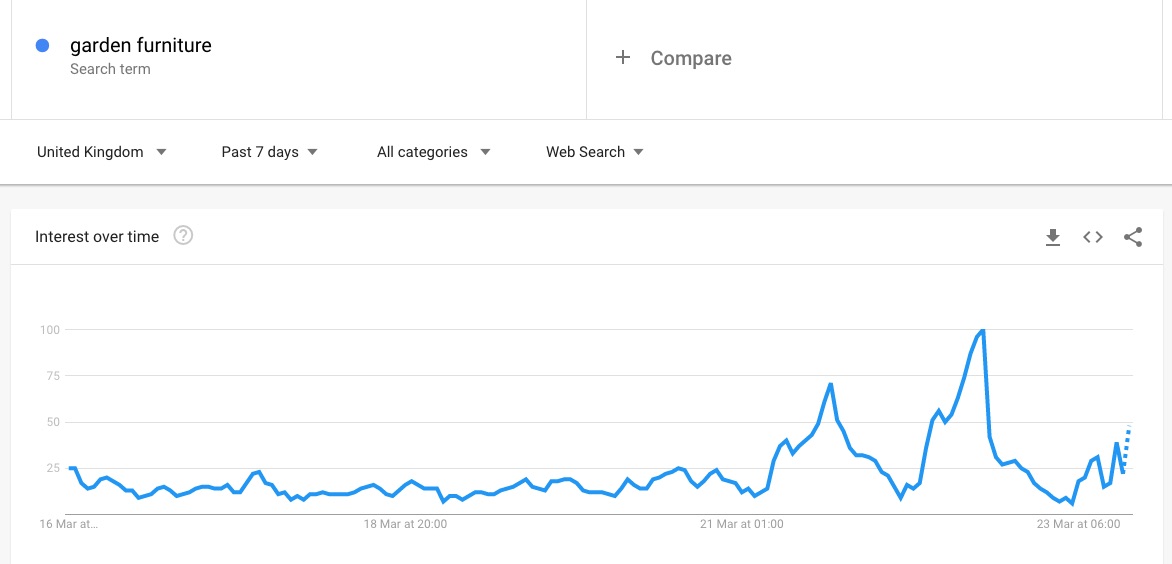
Craft sites and general crafting terms have a huge amount of interest due to people remaining at home and having kids to entertain. As an example, here’s rising search demand for craft supplies:
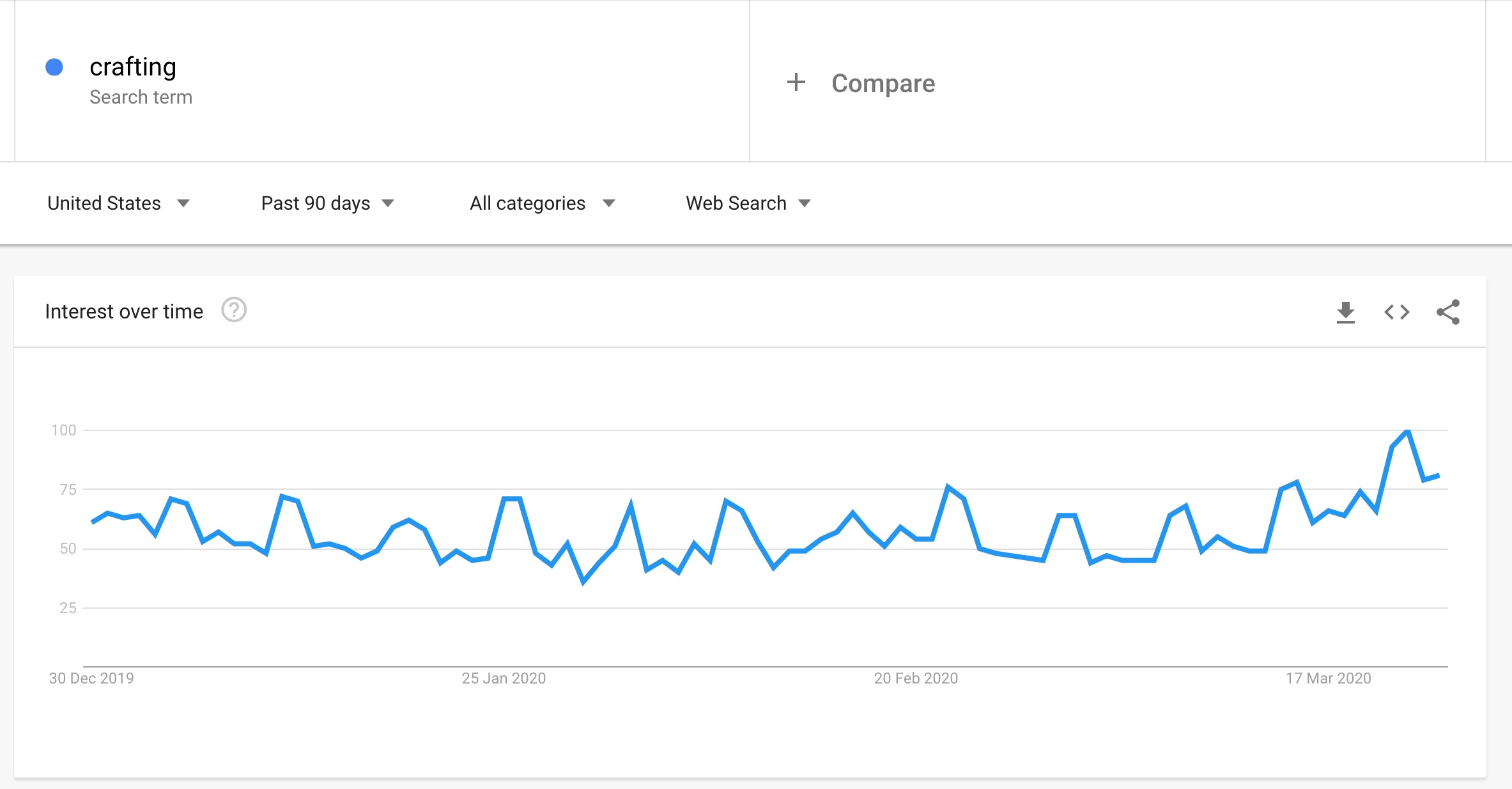
And of course, home gaming and entertainment have both skyrocketed over the past week or so. Both Xbox and Netflix have seen notable spikes in search interest over the past week:
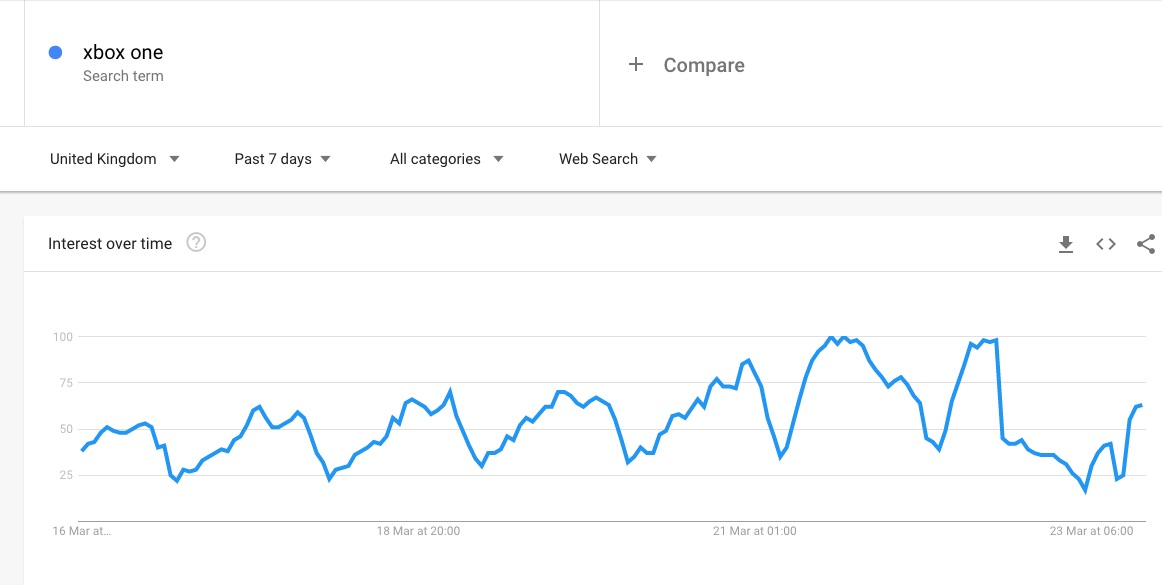
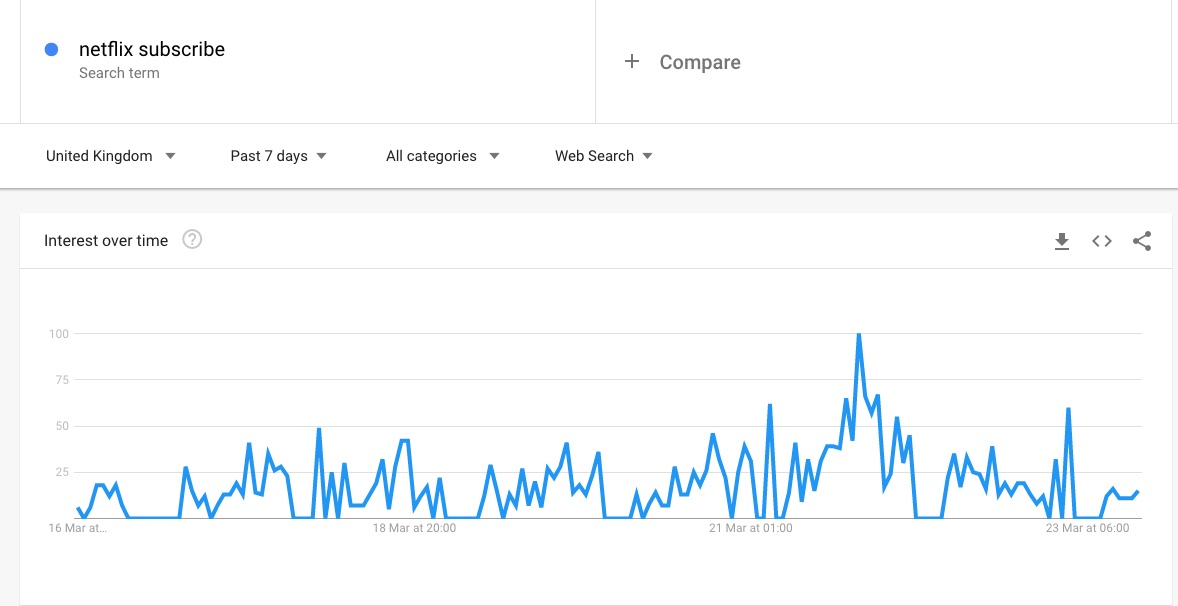
Which Search Terms Are Declining?
Fashion retailers have lost a lot of visitors at the moment. After all, who’s buying a new outfit just to stay in the house?
It’s not just high street retailers that are suffering, ecommerce brands such as Asos are also seeing a dip due to COVID-19:
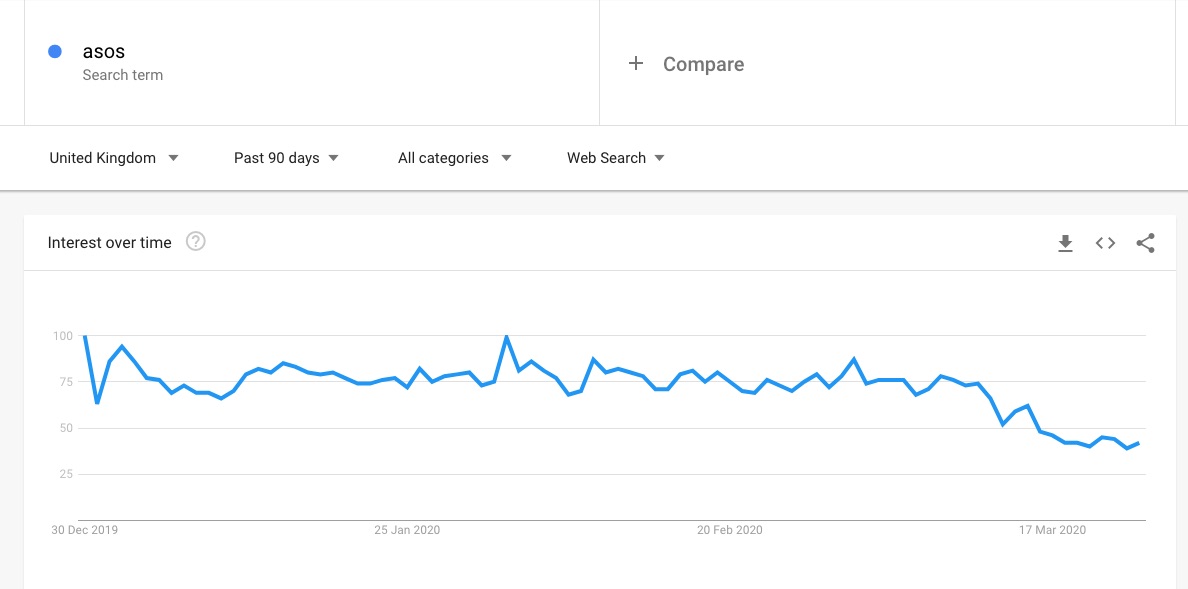
Travel has understandably nosedived. Traffic to lots of travel sites is ironically up, but most of it related to customer service requests or cancellations.
Here are the fastest rising searches related to hotels.com:
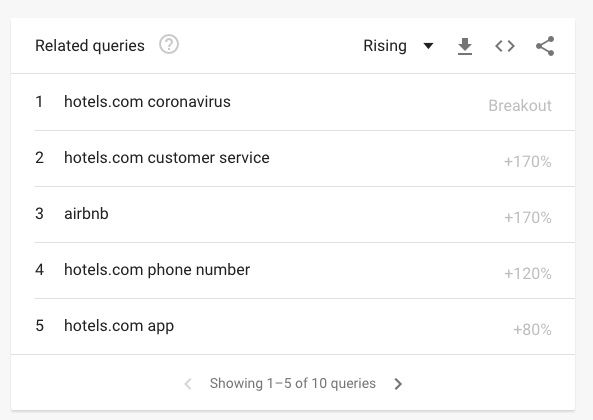
How Can Digital Marketers Adapt?
Many businesses will be reviewing their budgets in light of COVID-19, with digital marketing spend naturally a soft target for businesses looking to make cuts.
There is certainly a need to work smarter under the current circumstances, but it’s a crucial time for marketers to adopt strategies for long-term profitability.
1. Manage PPC Budget Efficiency
Statements around switching off PPC campaigns entirely, one of the primary sources of new business for many companies, could clearly be hugely damaging.
Instead, look to manage efficiencies across accounts where possible.
- Cut back on any non-essential upper-funnel keywords with lower conversion rates where search-demand may be waning.
- Save potentially reduced budgets for keywords with a higher likelihood of generating conversions.
Pausing campaigns and starting again will also mean higher CPCs as campaigns will have to go back through an initial learning phase.
CPCs at the moment will likely be lower as many businesses scale back, so for those clients who can continue to function they should capitalize on this where possible.
There’s also the consideration of longer-term impacts.
Quality score is based on your CTR relative to others in the auction.
If other people stop advertising, you can make CTR gains which in the long term will improve your QS and lower your CPCs.
The reverse is also true – so clients should be aware that they can’t just switch off campaigns and resume them like nothing ever happened!
2. Retain Organic Visibility
When it comes to organic activity, SEO is clearly a longer-term strategy and the tap can’t (and shouldn’t) be switched off as with PPC.
Google will be tweaking their algorithms now more than ever to ensure that the public gets the most accurate information, so to ignore the basics would risk reducing organic visibility in the long term.
Google will not suspend updates during the coronavirus because now more than ever we need accurate information – Hangout with @methode
— Mark Traphagen 🏠 (@marktraphagen) March 17, 2020
Organic search is one of the most viable channels in any scenario.
People will always be searching, perhaps more now than ever before.
Businesses with online selling capabilities are in a better position than any to continue to do business in what is a difficult period for many.
3. Share Experiences Through Digital PR
Yes, the news is awash with COVID-19 stories, but digital PR activity shouldn’t stop during coronavirus.
Now is a great opportunity to get in touch with journalists with interesting news stories that are a distraction from the wider news.
People still want to read good news stories and want escapism from the pandemic currently dominating mainstream media.
Hello #PR friends! We can’t write a whole paper about Coronavirus. We don’t want to. We need your non-CV themed stories more than ever. Fun stuff especially. Email in my bio! #journorequest
— Felicity Cross (@fliccross) March 17, 2020
Journalists themselves have been quoted on social media multiple times saying they need to put a smile on people’s faces.
If the story is strong, it can still get picked up right now.
If your business can offer comments to help other businesses and people during this tough time, distract them, or put a smile on their faces, that’s a great thing and should be encouraged!
4. Be Useful on Social Media
There will be a lot more people logging in to and spending time on social platforms as professionals start to adapt to the working from home lifestyle.
This is a great time to re-imagine your social media strategy, or if you don’t have one, it’s a great time to start.
Below are some general tips for brands looking to revamp their social strategy and messaging based on current trends.
- Be helpful: Give customers credible, detailed information about the things they need. Be objective and clear. Reinforce “we are here to help you.”
- Help create communities among customers and help people connect, both locally and globally.
- Be present in the early hours of the morning or late hours of the evening: Our habits are evolving and it’s important to let consumers know that solutions are available whenever, wherever.
- Look for people who are helping and find ways to support or celebrate them. They might be employees, people who use your products, or people who could use support.
- Find ways to enrich people’s lives as we isolate and combat both boredom and anxiety.
So even though we all may be feeling isolated, the next few weeks gives our businesses an opportunity to be even more social and more community-led.
It also lets your brand become a park of happiness during this period of darkness.
Emerge Ready to do Business
The tips outlined in this are a general guide to adapting to COVID-19.
Clearly, there’s no one-size-fits-all approach to digital strategy.
But one thing is for certain, it’s that we as marketers must ensure our brands are ready to do business online the day consumer confidence starts to increase.
This will enable us to avoid a long-term impact on market share.
More Resources:
- 7 Ways COVID-19 Is Affecting Search Traffic & How SEOs Can Respond
- 13 Ways Businesses Can Use SEO & Marketing to Combat Coronavirus Impact
- Working with SEO Clients: Strategies for Now & After COVID-19
Image Credits
All screenshots taken by author, March 2020





